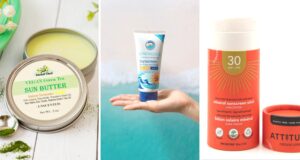Transitioning to a zero waste bathroom is a total overhaul of everything from your toothbrush to your toilet paper.
There are so many reasons to adopt a zero waste lifestyle, which is ultimately a mindset that looks to redefine the current system of production and consumption by limiting the amount of product deposited into landfills following its use.
An average American’s bathroom is filled with single-use, disposable and toxic items that are used almost every single day like Q-tips and floss. It is the second most wasteful part of the home, behind the kitchen, but the good news is it’s easy to transition to a zero-waste bathroom.
By transitioning, you’ll be reducing meaningless shopping, focusing on long-lasting and high-quality products, saving money, and helping conserve resources.
This post may contain affiliate links. Please see our disclosure.
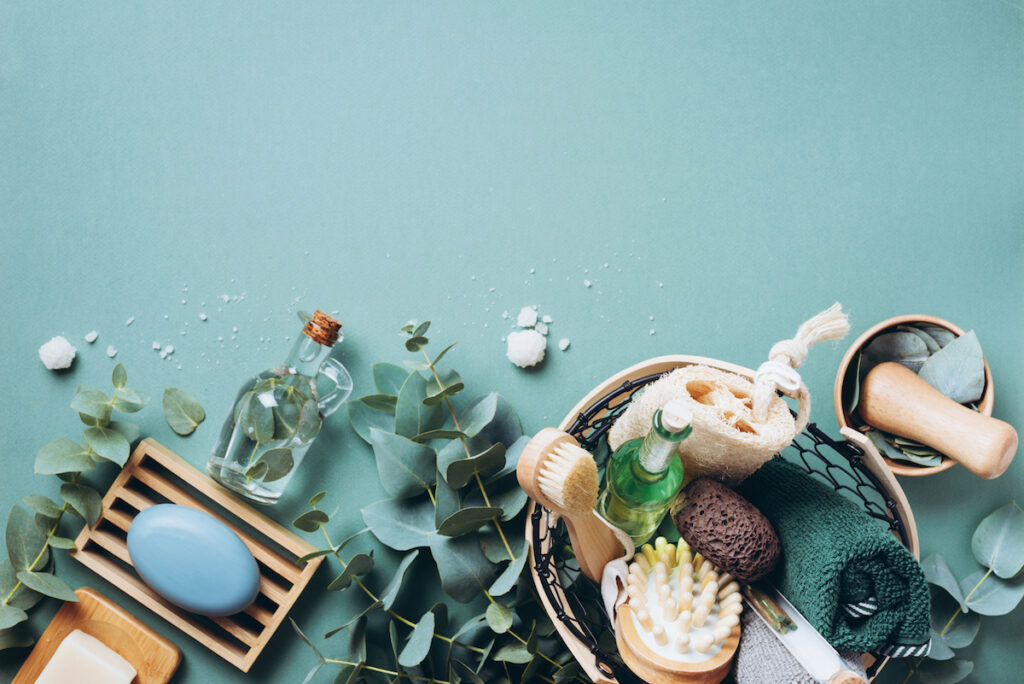
What Exactly Is a Zero Waste Bathroom?
If it’s in your bathroom, there is probably a zero waste option for it. It may seem overwhelming to change everything at once, but take your time choosing the products you replace.
There are plenty of zero waste bathroom hacks, like slowly using what you already have and replacing with a zero waste alternative as you need. Or, you can find a zero waste bathroom kit to replace multiple products at once.
As you transition, you’ll find yourself refilling more containers, choosing unpackaged products and swapping plastic for more biodegradable materials. There are so many zero waste alternatives to what’s under your bathroom sink and in your shower, and our list can help you start to find what to find an alternative for and the companies you can purchase from.
Zero Waste Bathroom
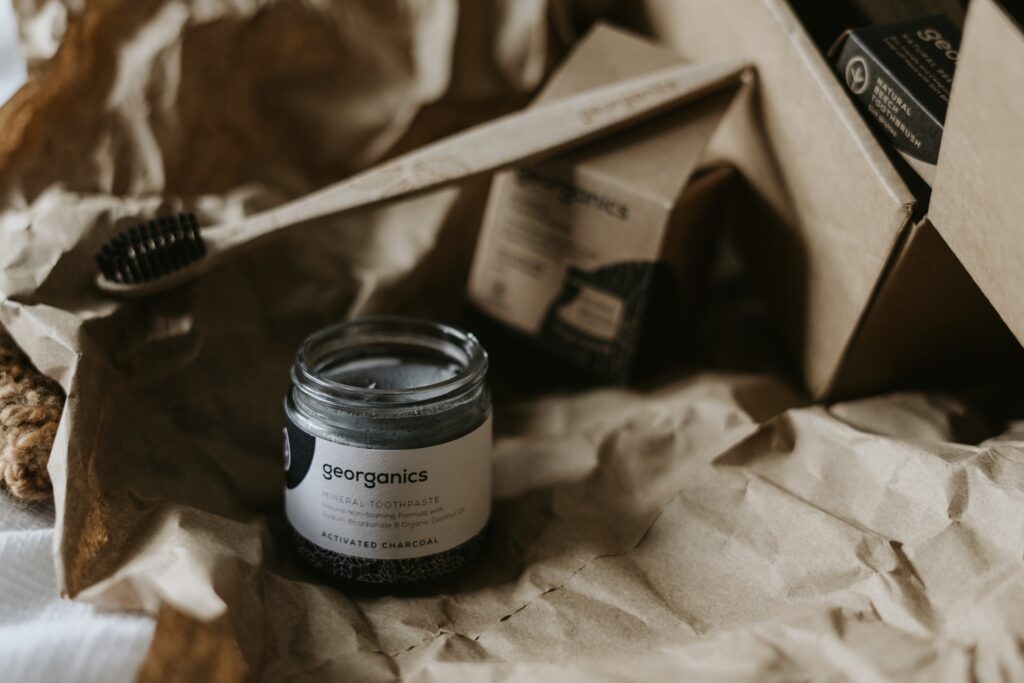
Toothbrush
Let’s start small. Did you know that a plastic toothbrush (a.k.a what most consumers use) never degrades? The most popular alternatives are bamboo and recycled plastic, but bamboo toothbrushes are far more advertised.
Make sure to do your research, especially if you’ll be purchasing online. You’ll want to purchase a quality toothbrush with plenty of reviews. A lot of the cheap toothbrushes and especially ones that may be given away for free tend to get soggy and aren’t smooth.
Try these toothbrush alternatives:
Toothpaste
Every good toothbrush needs a good companion: toothpaste. If you haven’t made the switch to a zero waste toothpaste, that plastic tube sitting on your bathroom counter might start to mock you. It probably doesn’t shock you, but that tube won’t degrade either. Yikes.
No need to fear, though, because there are plenty of zero waste toothpaste options that will make you feel the same clean and fresh breath feeling. Some options come in a recyclable tub, and others are chewable without any plastic in sight.
Try these toothpaste alternatives:
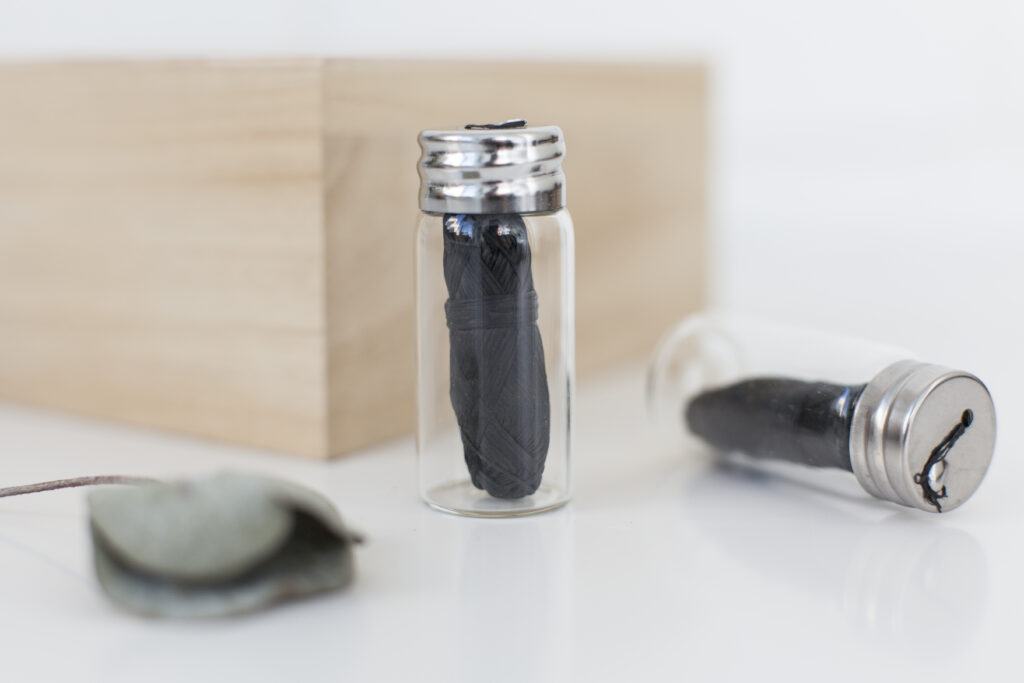
Floss
Round out your oral care with a zero waste floss. Not only is floss typically plastic, but it’s toxic. Most, if not all, traditional floss is coated with PFC, which is a chemical found in teflon. While it’s added to make the floss glide better, there are many issues linked to PFC like thyroid disease, dementia and cancer.
And while you, and many researchers, may find flossing unnecessary, it’s still an important part of oral care. You can replace your floss with powders, plastic-free, and PFC-free traditional floss, and even a waterpik.
Try these floss alternatives:
Mouthwash
Once you’re done brushing and flossing, consider a zero waste mouthwash. Not only are mouthwashes packaged in single-use plastic, but what’s in your mouthwash can often have harmful impacts on the environment.
A simple Google search will give you a look into all the options: tablets, chews, homemade regimes. Be sure to try different products to determine what is best for you.
Try these mouthwash alternatives:
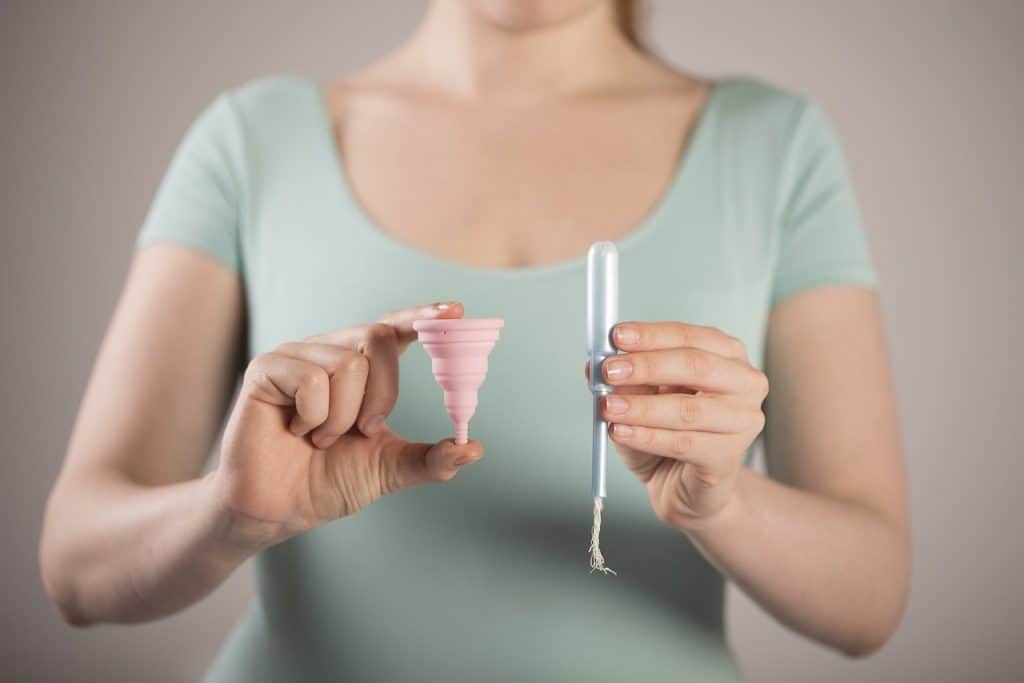
Menstrual Cup
Ladies, can you imagine how many wasteful, one-use products you use each time Aunt Flo comes to visit? It’s a lot. But, a menstrual cup is an easy way to replace those wasteful products. On average, they can replace at least two super tampons.
Menstrual cups are small, flexible cups made of medical-grade silicone, making them easy to clean and reusable. Instead of absorbing blood, the cup catches it, which makes it safer for you.
Q-Tips
Whether or not you’re on the side of the aisle that uses a q-tip every day or only every once in a while, there’s good odds that there’s a pack of q-tips under your sink. These tiny tools leave a lasting impact on the planet, especially if you think about the number of consumers that use them daily.
There are plenty of alternatives, whether it’s bamboo, biodegradable or reusable, there’s plenty of options.
Try these q-tip alternatives:
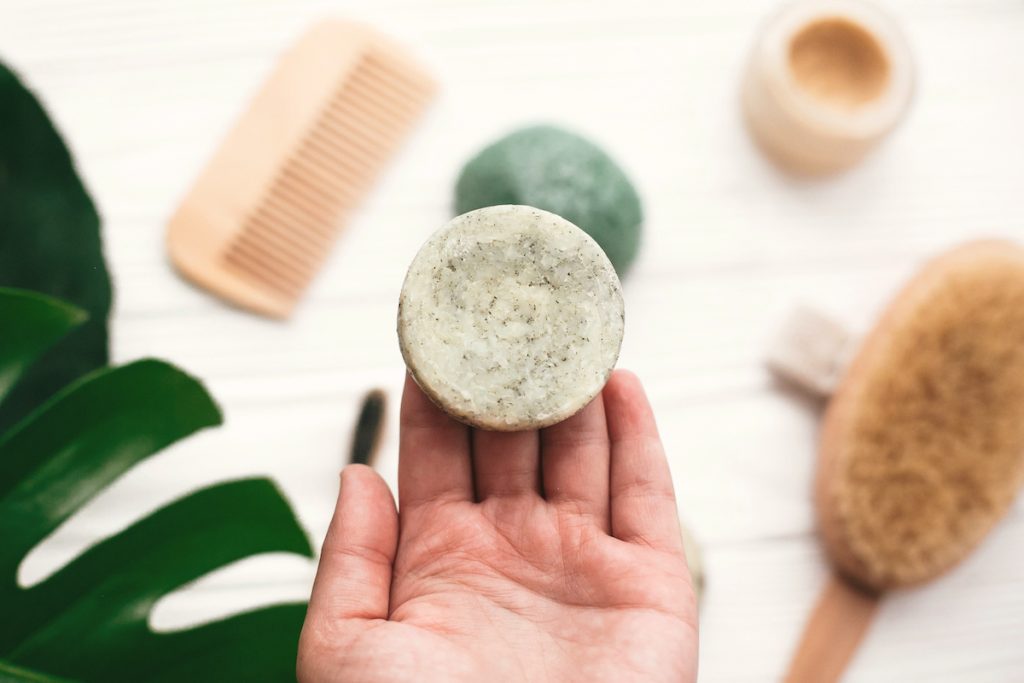
Shampoo
Everyone uses shampoo, and most shampoo companies use a lot of plastic to package your product. A walk down the shampoo aisle shows product after product in wasteful packaging.
There are plenty of ways you can transition to a zero waste shampoo, whether it’s at a refill store to refill liquid products or using a shampoo bar. Either way will help you help the planet, and steer clear of chemicals and products that can cause buildup and greasy hair.
See our full article on zero waste shampoo complete with product options and recipes.
Conditioner
Every good shampoo needs a conditioner. Just like the packaging of the shampoo is wasteful, so can that of your conditioner. While you probably use less conditioner than shampoo, you can still transition to a zero waste conditioner to make a lasting impact.
Zero waste conditioner can be bought as a bar or in recyclable packagings like glass or aluminum. Some companies will even send you a replacement each month (or how often you choose).
Try these conditioner alternatives:
Body Wash/Soap
Not only can the plastics and packaging of many soaps harm the planet, but the products in them can harm your skin. Making the switch to a zero waste soap can be the best decision for you, your skin and the environment.
Transitioning to a zero waste body wash is pretty easy, especially since a lot of people prefer bar soap anyway, which eliminates the plastic packaging if it comes in paper packaging. And, if you don’t like bar soap, there’s also the option to purchase a refillable body wash, just like you can with shampoo and conditioner.
Hairbrush
Traditional hair brushes are designed much like toothbrushes, with a plastic handle that doesn’t degrade once disposed of. And while I doubt you’re disposing of your hairbrush at the end of every day, your hairbrush could sit in a landfill for hundreds of years after you throw it out.
The most sustainable hairbrush option currently is bamboo, but there are also wood options to make the switch. Either way, the brush will glide through your hair easier and tease out natural oils from the scalp and produce less static.
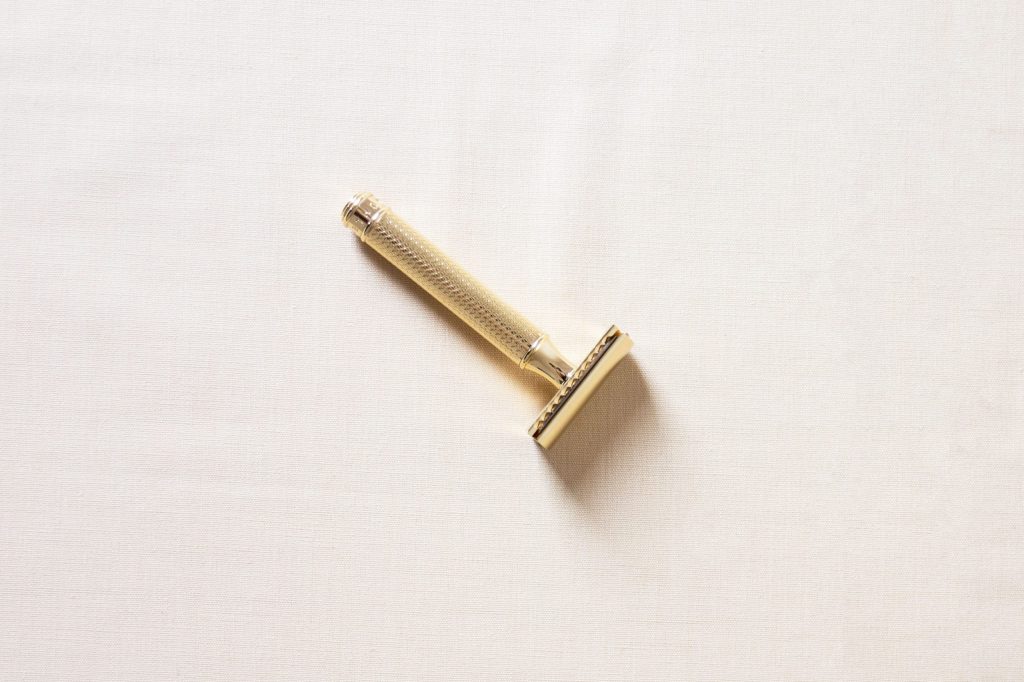
Razor
A zero waste bathroom wouldn’t be complete without getting rid of all those plastic razors. The EPA once estimated that almost 2 billion razors and refill blades end up in the landfill each year in the U.S. alone.
In addition to helping the environment, most zero waste razor options will also save you money, get you a closer shave and cause less irritation.
Try these razor alternatives:
Toilet Paper
Talk about wasteful! Estimates suggest that 15 million trees worth of toilet paper are flushed down the toilet every year. It may be hard to think of a zero waste alternative. But, there are more options than you think.
You can cut out toilet paper altogether with a bidet, or opt for plastic-free or toilet paper made from recycled materials. Any way you slice it, there’s a toilet paper alternative.
Try these toilet paper alternatives:
Deodorant
A walk past the personal care section of your local store will be eye-opening enough to the amount of plastic used in the deodorant industry. While some tubes can be recycled, it is usually once a part or parts of the container.
There are plenty of deodorant options to switch to, and many are also organic and designed to be kind to sensitive skin. Win, win, win.
Try these deodorant alternatives:
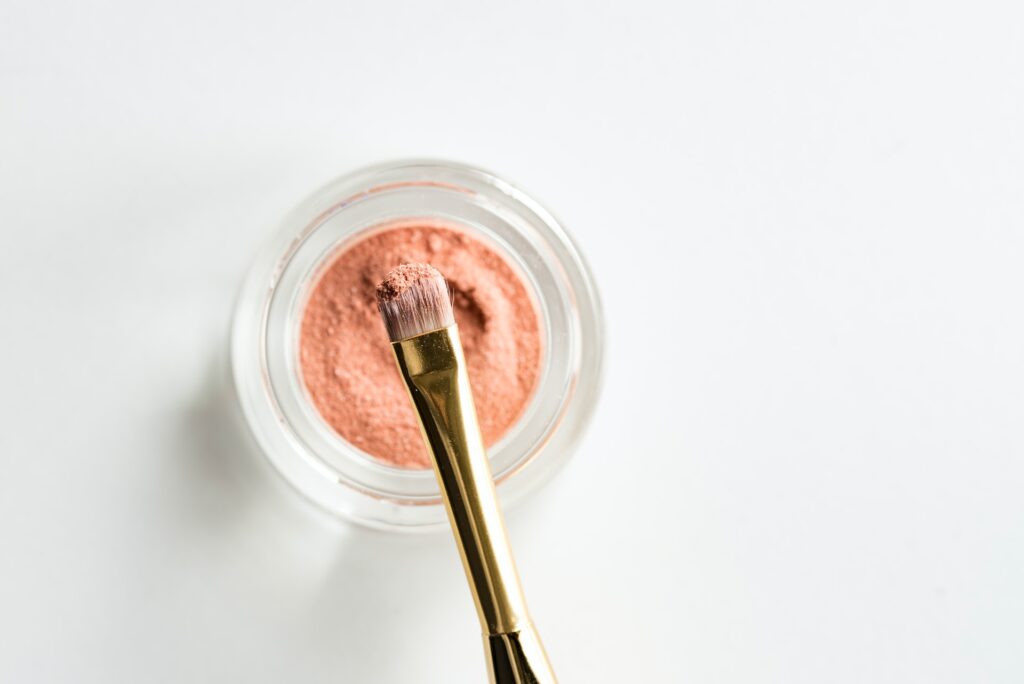
Make-Up
There are so many companies creating natural make-up alternatives to the harsh chemicals of traditional cosmetics, and many of them are also zero waste. Almost all traditional makeup is packaged in thick plastic that cannot be recycled.
While you’re transitioning your make-up palette to a zero waste lifestyle, make sure to pick out some reusable makeup pads to remove your make-up at the end of the day.
Lotion
Following behind the example of zero waste makeup brands, many zero waste skincare brands have started to revolutionize the options consumers have to protect their skin while making the best choices for the environment.
There are plenty of alternatives out there to adopt in your zero waste bathroom, whether it’s a recyclable or refillable bottle or a bar that you replace once you’re done with it.
Try these lotion alternatives:
Reusable Cloths
Whether it’s washing your face, cleaning your bathroom counter, or wiping your hands, a reusable cloth will ensure that you’re not using a paper towel every time you need to wipe a surface.
To adopt a zero waste bathroom cleaning routine, you can opt to use a reusable cloth and a sustainable cleaning product (below) instead of one-use wipes.
Cleaning products
Switching up the products you use for everyday cleaning can not only help the environment, but also your health and wallet. Most conventional cleaning products are packaged in plastic so they aren’t biodegradable, and they tend to be made with toxic ingredients.
Zero waste cleaning products can be packaged in recyclable plastic bottles or glass, or be refillable like many of the soaps on this list.
Try these cleaning product alternatives:
- 8 of the Best Hikes near Gatlinburg for All Skill Levels and Seasons - November 5, 2023
- 16 Sustainable Swimwear Brands to Check Out This Summer - June 14, 2023
- The Best Shark Gifts for the Shark Enthusiasts - September 7, 2022



